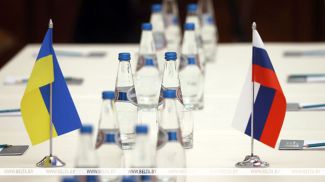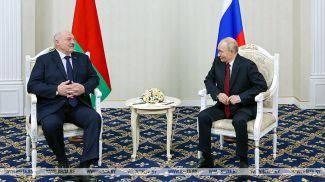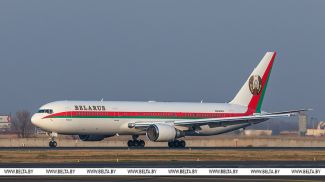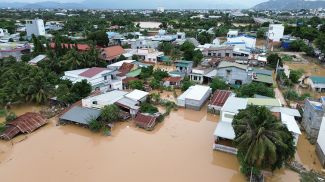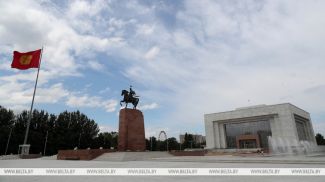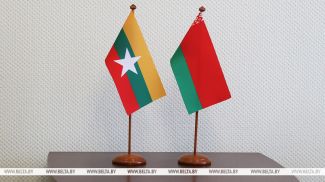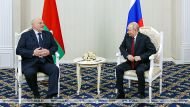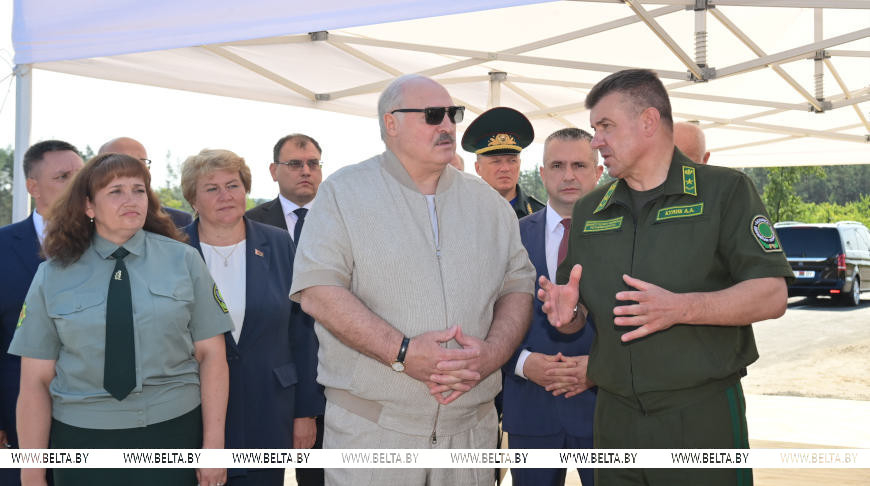
News of the story
"President's Week"
The work schedule of the Belarus president is always full of events. Aleksandr Lukashenko holds conferences and working meetings on the most topical matters concerning the country’s development, regularly visits the regions, goes on foreign trips and welcomes foreign guests, talks to reporters, signs decrees and laws. And even if there are no public events, it does not mean that the head of state does not work. It must be said that even when he relaxes, for instance, by playing ice hockey or chopping firewood, Aleksandr Lukashenko happens to find the time to give yet another instruction. All the decisions must be prompted by life, he likes to say.
The President’s Week project is intended for those, who want to keep up with the head of state, be up-to-date on the latest statements and decisions of the Belarusian leader.
Aleksandr Lukashenko’s work week began with a close look at a number of international affairs. The general public learned about details of negotiations with President of Russia Vladimir Putin on Valaam Island. The head of state also identified priorities in cooperation with China, interaction with international partners within the framework of the Shanghai Cooperation Organization and BRICS.
Tuesday, 30 July was dedicated to analyzing the work of Belarus’ academia. The main task is to keep up with world trends and even stay ahead of the curve.
A lot of events this week were prompted by the capital punishment the German citizen Rico Krieger had been sentenced to in Belarus. After discussing details with those, who had been involved in the process, Aleksandr Lukashenko granted a presidential pardon to the German. Later on news was released about a major international prisoner exchange between Russia and the West. Belarus played a role in that.
On Thursday, 1 August Aleksandr Lukashenko presented government awards to workers of enterprises and organizations belonging to the Belarus President Property Management Directorate. The ceremony was timed to the directorate’s 30th anniversary. It was a small unit originally. But these days it is essentially a huge ministry-like structure. Thousands of people all over the country are employed by the Belarus President Property Management Directorate.

The president spent Friday and Saturday working in the Polesie area in Belarus’ south. He came to Mozyr District first as the area most heavily affected by a recent storm. Aid to the local population, the processing of trees toppled by winds, and the restoration of forests were discussed.
The next day in Petrikov District the head of state took a close look at agricultural affairs. A sowing campaign is already in progress in the country’s south. Aleksandr Lukashenko described proper sowing and planting as genuine art. The president also surprisingly appointed the new head of the Petrikov District administration right there in the field.
On Sunday Aleksandr Lukashenko boarded a helicopter to examine the northwest of Gomel Oblast and southern parts of Minsk Oblast from the air. He evaluated progress of the harvesting campaign, the state of meliorated lands, and the work of the mining enterprise Slavkaliy.
The Olympic Games in Paris gave reasons to feel joy for the accomplishments secured by Belarusian athletes in high-performance sports despite all the restrictions and barriers raised for Belarusian athletes. The trampoliners Ivan Litvinovich and Viyaleta Bardzilouskaya won a gold medal and a silver medal. The Belarusian rower Yauheni Zalaty won a silver medal. Aleksandr Lukashenko sent warm congratulations and wishes of more victories to the athletes and their coaches.
The head of state also had a number of important phone calls this week. He and Chairman of the Board of the Russian state oil company Rosneft Igor Sechin discussed prospects of cooperation (evidently in furtherance of the agreements reached on Valaam Island). Aleksandr Lukashenko also talked to Chairman of the Central Committee of the Communist Party of the Russian Federation Gennady Zyuganov over the phone. The organization of the second international antifascist forum in Minsk was discussed.
While in Mozyr District, Aleksandr Lukashenko raised the matter of the arrest of four Latvian citizens among other things. A lot of negative comments about Belarus were made in the wake of the arrest but the reason was simple: illegal drugs.
The president also talked about the state of his health, which is also often discussed on the Internet.
Apart from that, this week offered a number of reasons for presidential congratulations both inside Belarus and abroad. Workers of Belarusian Railways and military personnel of the Special Operations Command celebrated their professional holidays. The State Control Committee celebrated the 30th anniversary of the agency’s foundation.
Aleksandr Lukashenko also congratulated Vietnam President To Lam on getting elected to the position of the General Secretary of the Central Committee of the Communist Party of Vietnam. Aleksandr Lukashenko congratulated Venezuelan President Nicolas Maduro on another victory in the presidential election. Congratulations were also sent to Morocco King Mohammed VI on the occasion of Throne Day and to the people of Switzerland on the occasion of National Day.
NO TOURISM. What does Aleksandr Lukashenko expect in foreign affairs and what did he and Putin talk about on Valaam Island?

On Monday, 29 July the head of state convened a government conference to discuss international affairs. The schedule of the president, the prime minister, and the minister of foreign affairs has been packed with foreign visits recently. China, the DPRK, Latin America countries… Apart from that, a number of most important visits to Belarus are supposed to take place. For instance, Premier of the State Council of the People’s Republic of China Li Qiang will arrive in Belarus soon. The visit will offer an opportunity to discuss the matters Aleksandr Lukashenko and Xi Jinping sketched out during the meeting in Astana in early July from the practical point of view.
All of it requires utmost focus on the past and upcoming events, the president said as a reason for holding the conference.
Aleksandr Lukashenko expects primarily the government and the Ministry of Foreign Affairs to be more persistent in realizing various arrangements made at the top level. “Let's agree that the role of the president is to, figuratively speaking, open a window of opportunities, to lay groundwork, to pave the way for future agreements between members of the government and prime ministers. And the government led by the Ministry of Foreign Affairs under the supervision of the Belarus President Administration must implement these agreements. Not to mention the arrangements reached by government members during their trips,” the head of state said.
“There should be no tourist trips. No tourism. There must be a result,” Aleksandr Lukashenko emphasized.
Highlights of the meeting with Putin and a deadline for addressing outstanding issues
Slightly more than a week ago the head of state was in Russia. He discussed various matters in an informal setting with his Russian counterpart Vladimir Putin on Valaam Island. Few details directly from the site were available. It was one of the reasons why all kinds of conspiracy theories and misinterpretations have appeared on the Internet. This is why it was useful to learn what happened directly from the president.
There were three main issues, which remained unresolved at the government level and which were discussed at the meeting with the Russian president: a new oil pricing formula, the vehicle recycling fee and upfront payments for oil deliveries. “As it usually happens, you and the Russian government have left some issues unresolved: the oil formula (a new pricing formula), the recycling fee and payments in advance for oil as the third issue,” the president told participants of the meeting.
As for payments in advance for oil, which is mainly supplied to Belarus by Rosneft Company, the Russian president was even indignant when he heard about the issue. “It cannot be! What advance payments are you talking about? We have been working without prepayment all our lives and we will be able to continue working like that,” the Belarusian leader shared the reaction of his Russian counterpart.
By the way, Aleksandr Lukashenko talked to the Rosneft head Igor Sechin later this week after this statement. It is quite possible details and prospects were discussed.
Security affairs were high on the agenda of the talks as well. “Those are confidential matters,” the president noted. “All defense, security, and law enforcement agencies and ministers are involved. The Ministry of Foreign Affairs contributes on certain things.”
Aleksandr Lukashenko assured that mutual understanding had been found on all the matters, there had been no rejection.
By the way, all the most important events – a session of the Union State Council of Ministers and the Supreme State Council session – will take place in Minsk in autumn ahead of the 25th anniversary of the Treaty on the Establishment of the Union State of Belarus and Russia. “The president and I agreed that all the outstanding issues should be settled by that time: issues in the remit of the security councils [the agreement on security guarantees] and in the remit of the governments,” the Belarusian leader emphasized. “All the issues should be settled by the beginning of the fourth quarter,” the head of state set the deadline.
Addressing Prime Minister Roman Golovchenko, Aleksandr Lukashenko urged him not to forget about strategic tasks in terms of new industries and competencies for the Belarusian economy: aircraft building, microelectronics, machine tool building. Due to the current situation the Russians are open to cooperation with Belarus. The country has an opportunity to master completely new competencies that are crucial for the future development of the state in addition to space exploration and nuclear energy.
Russian enterprises have a very strong interest in products of the domestic mechanical engineering industry, but in order to preserve this interest in the future it is necessary to invest now in improving technologies and mastering new, more up-to-date products. “Russians allocate funds for this. We just need to wisely approach it and spend the funds,” Aleksandr Lukashenko instructed. “You remember the agreements President Putin and I reached during his latest visit to Minsk. Back then he said and I quote ‘Belarus should be an independent, self-sufficient country with a sustainable economic basis’,” the head of state said.

A number of instructions were issued to step up the work of the Standing Committee of the Union State of Belarus and Russia in individual areas. A number of routine problems that citizens of Belarus and Russia still encounter on a daily basis need to be addressed. “Personal inspections at airports, roaming charges that have not been canceled so far, the inability to buy train tickets on holidays due to the lack of trains. Whose issues are these?” the president addressed those present.
A strategy for the Shanghai Cooperation Organization and BRICS
The head of state recalled that in July 2024 Belarus took part in the SCO summit in Astana in a new status - as a member of this organization. A number of bilateral meetings were held. “Those meetings were good. Specific agreements were reached there. Let’s implement them,” the Belarusian leader said.
“We must immediately draw a strategy to move towards the goals we have outlined. We should not waste time. Colossal prospects are opening up. First of all, additional opportunities to get access to a huge market of goods and services, to exchange expertise and knowledge, raise investments. And most importantly, to diversify logistics and payments, reduce political risks. I sketched out all the Belarusian initiatives in Astana,” the president said.

Belarus has also been invited to attend the upcoming BRICS summit in Kazan. This serious organization has the world’s most powerful countries in its ranks and accounts for more than 40% of the world’s population. “We are interested in joining integration processes in this space. BRICS is yet another pillar that can help us maintain balance and economic stability,” said Aleksandr Lukashenko.
The president instructed the Ministry of Foreign Affairs to draft a plan for Belarus’ participation in this platform and his bilateral meetings. By the way, Belarusian Minister of Foreign Affairs Maksim Ryzhenkov told reporters later on that Belarus intends to become a partner for cooperation in BRICS.
The head of state talked about opportunities for advancing cooperation using concrete examples. For instance, Pakistan is a Shanghai Cooperation Organization member state with the population of over 200 million people. The country is interested in what Belarus has to offer.
“We don’t need to spread ourselves too thin across all continents. I want to reiterate: we don’t have the kind of economy to maintain presence all over the world. We need to set priorities right and get laser focused on them,” the Belarusian leader emphasized.

TO STAY AHEAD OF TIME. How is science supposed to advance the country’s economy?
On 30 July Aleksandr Lukashenko met with the working group tasked with analyzing the operation of the National Academy of Sciences of Belarus. This group was set up in June 2024 upon an instruction of the head of state. It operates on a permanent basis and studies the applicability and effectiveness of scientific research and R&D efforts of scientists of the National Academy of Sciences of Belarus, the introduction of R&D products in branches of the economy and the social sphere, the development of import-substituting products and technologies, and the export of science and engineering products. The working group is expected to submit a report to the president every year to present results of the work and proposals for resolving identified issues.
Both at the beginning of the meeting and during the consequent discussion the president repeatedly emphasized that coming up with concrete conclusions and solutions is not necessary right now. The meeting was organized in order to hear out various opinions, including critical ones, get an update on existing problems, and take a first pass at discussing the state of Belarusian science.

“I do not want senior officials of the academy and scientists in attendance to think that we are preparing some kind of action against the National Academy of Sciences. We are not. We need to most seriously study the problems facing the Academy of Sciences and make appropriate decisions, because we can’t proceed any further without science,” Aleksandr Lukashenko remarked. “Don’t rush into conclusions. The issue is very serious.”
Aleksandr Lukashenko reminded that since the very first days of his presidency he has viewed science as a powerful driver of all transformations in the society and now is the time to ask scientists to show concrete results. The president explained the importance of the contribution of science to the country’s development as plainly and as simply as possible. Roads, housing, education, culture, sport facilities, and other things will develop if science-intensive competitive manufacturing is ensured in the country. It will result in higher export, decent salaries, tax revenues, and the state budget. And success on new markets depends on what products are offered there and how strong the demand for them is.
“The most important thing is for domestic science to drive the country’s economy. In other words, there should be an appreciable result that the state and people can feel. Especially at the present time,” the Belarusian leader demanded.
The operation of the working group will continue. In accordance with the executive order the president has signed previously, by 1 November 2024 (by 15 July every year after that) the working group has to submit a report to the president to present results of the work and proposals for resolving identified issues. These materials are also supposed to be reviewed by the parliament and the government. After that the president is supposed to have a major substantial conversation with all the interested parties. As a result of the conversation the head of state will make concrete decisions.

Serious drawbacks in the National Academy of Sciences
The head of state emphasized in his opening remarks that Belarus is now at such a development stage when it is impossible to make any further progress without science. “Therefore, science is of paramount importance. We assign a high priority to science, it is impossible to move forward without it. Yet, lately I have seen that the Academy of Sciences has made serious mistakes. Such things also happen. Researchers have to go along unbeaten paths, wrap their head around serious problems, and climb new peaks. Therefore, naturally, mistakes are possible. But what alarmed me was that errors have been made by the Academy of Sciences in areas where they should not happen, in areas where we have already learned something: in animal husbandry and crop farming,” Aleksandr Lukashenko said.

For instance, applied science centers run by the academy are no better than similar facilities that operate outside the National Academy of Sciences. “But they should be the best,” the head of state emphasized.
Apart from that, the creation of the working group was prompted by appeals from some specialists and members of the government: “They are trying to convince me that we need to take a serious look at the development of academic science and make relevant decisions in all areas.”
According to the president, the work of the academic community gave rise to many questions: “There are individual accomplishments but there is also serious dissatisfaction with results.”
To stay at the forefront of world trends
Speaking in general about the development of science and the significance of science, the president emphasized: “We live in an era of unprecedented opportunities for the development of our country. The opportunities are colossal. We cannot miss them. We have a solid base and certain results both in traditional industries and new areas of the economy. But without a real breakthrough in science it will not be simply hard to reach the next level. It will be impossible. Science must be ahead of the time. In no case should it lag behind,” the head of state emphasized.

He drew attention to the insanely rapid development of the world, especially in Asia and in the East. “But the West is not dragging its feet either. The last NATO summit declared ‘a technological breakthrough’ its fourth priority (up to the creation of central bodies at the Alliance level). These are quantum technologies, artificial intelligence, biology and digital transformation. We should not and we have no right to lag behind,” the Belarusian leader said.
Good healthy patriotism is also an important thing for scientists to have although science is international per se. “But scientists are born, study and reach certain heights as citizens of their own country. The majority of great scientists are true patriots. I will say more: a citizen who has the high status of a scientist should be the most active conduit of the state policy,” Aleksandr Lukashenko is convinced.
No nepotism and conspiracy of silence
Members of the Academy of Sciences are getting elected right now. The president stressed that the importance of scientific developments for the state is the cornerstone for selecting those Academy members. It is also important to have your own school of intellectual tradition that attracts young people to science. “If there are no people to continue your ideas, if there is no continuity, then there is no scientist,” Aleksandr Lukashenko remarked.
“I fully support proposals made by scientists themselves that it is necessary to establish clear criteria for the selection of candidates for the rank of academicians and corresponding members. No nepotism and mutual cover-up, which our academia is often guilty of,” the head of state said.
In his words, then elections will be held in accordance with the updated charter of the National Academy of Sciences of Belarus and the regulation on elections. “As one strives to enhance the pool of academicians and corresponding members, it is necessary to bear in mind whether their real contribution to the domestic economy is sufficient, whether our scientists are at the forefront of accomplishing strategic economic and social tasks,” the president said.

BLITZ KRIEGER. How did Aleksandr Lukashenko pardon a German citizen and why was the Kremlin thankful for that?
Belarus-related international agenda this week revolved largely around the fate of one German citizen. Rico Krieger has been found guilty on charges specified by six articles of the Criminal Code and has been sentenced to capital punishment for committing a terrorist attack. An interesting coincidence: Krieg means war in German and the last name of the German citizen, who was convicted in Belarus, is Krieger, which is translated as warrior. And Belarusians have always known how to handle German warriors. But it is possible Mister Krieger studied history using different textbooks.
One way or another, the matter reached the presidential level: in Belarus the head of state has the authority to grant pardons. Events went very fast after that.
In the morning on Tuesday Aleksandr Lukashenko was in the Palace of Independence to host a meeting of people, who are involved in the German citizen’s court case: the chairman of the State Security Committee (KGB), the deputy head of the Belarus President Administration in charge of overseeing legal affairs, a detective, an attorney, and even a reporter, who was covering the court process. The president wanted to confer, hear out opinions of the parties, and make the final decision.

News that Rico Krieger was pardoned was released in the evening on the same day. Mass media circulated a video of him crying upon hearing the news and calling it the best moment in his life.
On Thursday it was revealed that Russia, the USA, and Germany exchanged 26 prisoners in the Ankara airport. Including Rico Krieger, who had been pardoned by the Belarus president. It was the largest operation of the kind in recent times. Eight Russian citizens, who had been detained and in prison in a number of NATO countries, as well as underage kids returned to the native country.
During a working trip to Mozyr District the next day Aleksandr Lukashenko made a few comments about the matter. He explained how negotiations on the prisoner swap between Russia and the West had proceeded.
Aleksandr Lukashenko said: “You saw that the guys have been extracted. We were asked to assist and did the best we could. People with life sentences in the West were freed. Truth be told, people like the U.S. president inflate their authority with this event although he had nothing to do with it. Security agencies conducted these talks. Even the diplomats were not involved. We agreed that we would proceed quietly – shouts all over the world began. These things are done quietly. After all, people’s lives are at stake.”
Speaking about Rico Krieger’s actions, the president drew attention to the danger his actions represented for the general public: “What would have happened if people had died, god forbid? It is good that they didn’t.”
“We don’t buy and sell people. We gave away the German in order to help people take away these poor souls. What is bad about it? And this German is alive and this guy was saved [Vadim Krasikov was given a life sentence in Germany],” Aleksandr Lukashenko added.
On the day of the exchange the Kremlin website posted a message to thank the Belarus president for the gesture of good will and for pardoning the German citizen, who had been sentenced to capital punishment. “Certainly, we should give the highest praise to the interaction we’ve had with the KGB, the Ministry of Foreign Affairs of Belarus and to the assistance that President Lukashenko has provided personally,” Press Secretary of the Russian President Dmitry Peskov said.
President of Russia Vladimir Putin also thanked Aleksandr Lukashenko for participation and assistance in a phone call on 2 August.
TRIUMPHANT TRAMPOLINE. Who won Belarus’ first gold and silver medals at the Paris Olympics?
Belarusian trampoline jumpers were triumphant at the Olympic Games in Paris by winning gold and silver medals. Belarus President Aleksandr Lukashenko congratulated the athletes and the coaching staff.
First, Viyaleta Bardzilouskaya won a silver medal during the Olympic Games. After that Ivan Litvinovich won a gold medal and secured his status as a two-time Olympic champion.
“Dear Ivan! We are all really proud of you! I thank you for the Olympic gold. Millions of Belarusians admire your will to win, motivation and strength of mind,” the Belarusian leader emphasized. “Winning gold at the Olympics is a huge achievement, and defending the Olympic champion title is a sporting feat, which put you in line with the world’s greatest athletes.”



“I heartily congratulate the coaches and specialists, who have invested their talent and skill in this victory. The Belarusian trampoline school has once again demonstrated the highest class and confirmed its deserved leadership in the world arena,” the congratulatory message reads.
Aleksandr Lukashenko wished the athlete strong health, happiness and new successes for the benefit of native Belarus.
In his congratulatory message to Viyaleta Bardzilouskaya the Belarus president stressed that this medal is a real triumph for her and the entire Belarusian Olympic team: “Despite any circumstances you have managed to demonstrate your honed skills, indomitable character and strength of spirit in competition with the world’s greatest athletes.”



Aleksandr Lukashenko also congratulated the coaching staff headed by Olga Vlasova on such a significant victory for the country. “We are proud of the Belarusian trampoline traditions,” the congratulatory message reads.
From the bottom of his heart the head of state wished the athlete strong health, prosperity and new achievements.
HELP PEOPLE PROPERLY. What was memorable about the president’s inspection in a storm-affected region?
On 2 August Aleksandr Lukashenko went to Mozyr District, Gomel Oblast where he was made familiar with progress of the work meant to clean up consequences of the storm, which hit this area and a number of other regions in mid-July.
The head of state was informed how consequences of the hurricane are being handled in Gomel Oblast and in Mozyr District and how power is being restored in the affected territories. The president was assured that all the populated localities already get power via permanent power lines instead of electric generators. Now electric companies need to replace old power lines where it is necessary and advisable.
Aleksandr Lukashenko visited a logging site outside the agrotown of Prudok, Mozyr District. After hearing out reports from officials he went to the agrotown and talked to the locals.
The head of state wondered what remained to be done after the July storm, whether local authorities helped repair houses and other buildings.
“They have done everything!” the local residents responded.
“I want to make sure that officials manage to do everything we’ve agreed on in time,” the president explained.
“They do!” the local residents said.
“Have you got your destroyed roofs fixed? I mean roofs of your houses. Everything needs to be restored the way it was. The rafter system, the sheathing, the roofing slates. Has everything been done? Good. Has electricity supply been reinstalled, connected it to every house? That’s also good. In other words, life has been restored,” noted Aleksandr Lukashenko.
The task to act according to life without pro forma attitudes
First of all, Aleksandr Lukashenko gave instructions to properly organize assistance to the population in the storm-affected areas. “We need to look at the situation on the ground. We shouldn’t offend people. Since such a thing happened, we need to help people properly,” the Belarusian leader emphasized.


The president gave additional instructions to check whether everything is properly organized with the provision and allocation of timber, roofing slates, and other construction materials necessary for rebuilding the structures. The head of state had received some information about this matter. This is why Aleksandr Lukashenko asked officials some pointed questions.
Aleksandr Lukashenko instructed to thoroughly examine every specific case and provide the necessary amount of construction materials.
Chairman of the Gomel Oblast Executive Committee Ivan Krupko assured that not a single day of downtime had been allowed and the work was proceeding on a tight schedule.

“[Together with the State Control Committee] you should take a reality check. Is it a problem to talk to people? Not just to report on the lack of roofing slate or roof boarding. This is why it is necessary to proceed from life to clarify the situation,” the president instructed.
The head of state was briefed on the progress of reconstruction work in the oblast, including social facilities. “When the works are over, everything should be checked. Those responsible for mismanagement will be held accountable. If they need something, they should get it. But only after stocktaking. This year the money should be returned to where it belongs. It is what we need,” the Belarusian leader instructed.
“Die but get things done in time. And keep in mind that we will verify the reports. There must be no lies. May god have mercy on you if you lie. You will have to meet stricter standards,” Aleksandr Lukashenko warned.
The recycling of windfall and the restoration of forests
One of the key items on the agenda is the processing of damaged and fallen trees, which should be followed by prompt reforestation. Individuals, worker collectives, and university students should also be involved in this effort. “We should restore all of it next year. We should make plans and schedules during the winter. [Deputy Prime Minister Yuri] Shuleiko reported to me yesterday that we have enough saplings. We need to put things to rights. This is the only way we can salvage these empty patches,” Aleksandr Lukashenko said.
The president demanded that the same approach to restoring order must be followed in agriculture as well. In particular, he pointed out serious shortcomings with soil tilling in the region, which had been clearly visible from the helicopter.



At a logging site the president was made familiar with the work to clear wind-fallen trees. It turned out that mature trees up to 100 years old had been toppled at the site. “This timber should have been cut a long time ago. This is commercial timber after all. 80-100 years old. You didn't harvest it. Well, god helped you by felling everything. Now we should remove it as fast as we can,” the Belarusian leader noted.
The head of state remarked that the demand for timber has recovered on the world market and domestic products will be in demand.
Aleksandr Lukashenko drew attention to the need to come up with optimal decisions on redeploying additional workforce and equipment. Timber harvesters should not stay idle in some places while they are badly needed in other places that have been affected by the storm.
A total of more than 41,000 hectares of forests has been damaged by the natural disaster. Some 18,000 hectares is now slated for clear-cutting. Of that 14,000 hectares is located in Gomel Oblast that has been affected the most. At present specialists from 80 forestry enterprises are working in the region. There are plans to harvest a total of more than 5 million m3 of timber from the forests hit by the storm.

Putting things right in Gomel Oblast
While talking to local residents, Aleksandr Lukashenko switched from specific problems relating to the cleanup of storm consequences to larger matters such as putting things right in the region as a whole. It is no secret that Gomel Oblast is lagging behind in a number of performance indicators and primarily in matters concerning discipline and farming standards.

“We need to put Gomel Oblast to rights. We’ve sent you an entire minister [Gomel Oblast Governor Ivan Krupko previously headed the Agriculture and Food Ministry]. It will be a shame if you fail to revive Gomel Oblast,” the president said. “Think about what we will cultivate. But Gomel Oblast needs to be put in order. Our agricultural workers do a very poor job plowing the fields: half of them have been plowed, half are neglected. Therefore, Ivan Ivanovich [Krupko] and I will think what to do about it over the winter.”
“But people also need to improve their discipline. You should not hope for someone to come here and do your job instead of you,” Aleksandr Lukashenko emphasized.
According to the head of state, the key to peaceful life is the diligent attitude of everyone to their jobs. “If we all do our jobs well and have no complaints about each other, then trust me, there will be no war. Everything depends only on you, not on me. You see that we are doing our best to prevent this pestilence from coming here,” the president emphasized. “They decided to threaten us. We lined up our army across the border. They withdrew their troops and we withdrew ours. We are not at war. We do not want to fight.”

Aleksandr Lukashenko cautioned that Belarus is ready to defend itself if necessary, but war is always a bad thing. “War means deaths on all sides. Thousands upon thousands of people die in war. This is why we do not need war. This is a matter under my purview. If there are problems, I will come to you. We will take up arms and defend our land. But it’s better not to fight, and we do not want this war,” the Belarusian leader said.
PERSONNEL DECISIONS IN THE FIELD. What kind of executives does Aleksandr Lukashenko want promoted?
On 3 August the president continued the working trip to the Polesie area. Matters concerning the development of agribusiness were in the center of the head of state’s attention. In Petrikov District Aleksandr Lukashenko went to the agricultural enterprise Polesie-Agroinvest, which had been founded and is owned by OAO Mozyr Oil Refinery.
In 2023 the enterprise had a gross agricultural output growth rate of 101.5% as against 2022. At the same time revenue from product sales rose by more than 12%. Net profit amounted to Br8.1 million. In January-June 2024 the company’s gross output totaled 109.4% year-on-year.


By the way, the head of the enterprise said that the parent enterprise provided financial aid only early on. “We’ve learned how to work since then. At present we finance current operations out of our own earnings,” Aleksandr Veremeyev told reporters.
A fast career track for the head of an agricultural enterprise
After hearing out officials, who reported on the progress of agricultural work, Aleksandr Lukashenko took care of a personnel appointment right there in the field – the vacant position of the chairman of the Petrikov District Executive Committee.
“Let’s go straight to the key point. Do you want him [Polesie-Agroinvest Director Aleksandr Veremeyev] to be the chairman of the district executive committee?” Aleksandr Lukashenko asked Gomel Oblast Governor Ivan Krupko.

The governor answered in the affirmative.
“Will he handle it?” the head of state asked.
The answer was once again affirmative.
Aleksandr Lukashenko asked Aleksandr Veremeyev whether he is well-informed about the matter of merging the local agricultural enterprises and what is his take on it. Making the existing agricultural enterprises larger by transferring lands and assets to more successful organizations and improving the economy of the agricultural sector as a whole by doing so is the idea.

Having discussed these technical matters, the president cautioned that the entire district should have the farming standards and results Polesie-Agroinvest has.
“Okay, you will assume the role of the chairman of the district executive committee on Monday. But keep in mind - this is a good agricultural enterprise. God forbid if you ruin it. Therefore, choose carefully the one who will succeed you,” the head of state said.
“I know his biography. I’ve studied it. This appointment did not come out of the blue. He is a local. He grew up here. A real Polesian. The kind of people I love and respect very much,” the president added. “Certainly, the local soil is not like the one in Grodno or Turov [in terms of fertility]. And we need to find people like that, who don’t whine or cry, but make the most of what they have.”
Aleksandr Lukashenko made the personnel decision when he was still in the field. But he saw additional proof he had made the right decision when he was on a tour of the local farm Turok, which is part of the agricultural enterprise. At the farm the president familiarized himself with the technological process of raising young cattle.

“If you keep things the way they are now all the time, then it is just what we need. This is perfect. Every district should have such executives who know animal husbandry technology,” the head of state emphasized. “This is perfect for cattle reproduction. You need nothing else. I really like this complex. It operates efficiently. There’s nothing I can add. Do as you see fit.”
The president added that if he has a chance, he will visit Petrikov District again in autumn in order to assess the performance of the new chairman. “You will tell me how you started working. Look at the personnel to identify people who have been stuck in one position for too long, those who want to work and those who don’t. As I always say, you can’t fire people left and right, even if you see that they need to be let go. You should give a person a chance. If you need my support, let me know,” the head of state advised.
“He needs to grow at least to the level of Ivan Ivanovich [Krupko, Chairman of the Gomel Oblast Executive Committee and a former agriculture and food minister], so that we can take him back, and he will sort things out in the oblast then,” Aleksandr Lukashenko added.
The art of planting and strict oversight
At the very beginning of the working trip to Petrikov District Aleksandr Lukashenko went to a field and was made familiar with progress of sowing winter cruciferous crops. Winter rapeseed and winter cress are already being planted in the region.
“Do you think it’s time to sow rapeseed in the south?” the president asked Gomel Oblast Governor Ivan Krupko. “I would advise you not to sow everything at once, but rather in 2-3 stages, and then make a conclusion. We need to choose the optimal time to sow crops in the south. I’m afraid that because of the agricultural practices and technologies used in Gomel Oblast, we will not be able to keep up with the growth [of crops]. If they grow too much in autumn, they may perish in the winter.”

Practice indicates that early planting can produce additional harvest but special solutions are needed to slow down crop growth. In other words, everything depends on the technology and farming standards. “Will you be able to apply the solutions? If you are, then fine. I will not interfere with your technologies but if I were you, I’d try to do it in 2-3 stages. Look at things. This is south after all. But I will not meddle with your technologies. Because they evolve over years and people get accustomed to them,” the Belarusian leader noted.
“The key thing is that planting is an art. If he [the head of the agricultural enterprise] and an agronomist oversee the work of machine operators on the ground, this work will be done properly. If you don’t, I see crazy shortcomings from above. Which means a seeder did the job in some places and it didn’t in other places. The management tells a machine operator to go and sow some field. So he does it alone without any oversight. But we need high-quality sowing. It is the key,” the head of state said.
Aleksandr Lukashenko also expressed concerns over other issues: “There are no unimportant things now. We have forgotten how to plow. If you look at the field, it is full of ridges. The plow is not adjusted. If you plow evenly, then you will spend less time doing other operations.”
Another instruction was to take very good care of equipment, especially imported machinery. The domestic manufacturing sector should put more efforts into import substitution.
On the whole, it is necessary to take good care of equipment and vehicles. “In order for equipment to operate properly, there must be order in the machine yard. Enter through one gate - exit through another gate. The strictest control,” Aleksandr Lukashenko advised.
The key to good harvest
The head of state was informed about progress of the harvesting campaign and other agricultural operations in the region. Six days of good weather are needed to finish the harvesting campaign. Aleksandr Lukashenko stated that there has been plenty of moisture this year even taking into account peculiarities of the region. But the average yield of headed cereals is not that high.
This is why the president demanded efficiency and strict compliance with all technological standards in agriculture. “It is an ideal year. There has been plenty of moisture. You need to learn to do better. If everyone else in the oblast works as well [as Polesie-Agroinvest], they would be at the peak, too. Everything is perfect and neat here,” Aleksandr Lukashenko noted.
“Don’t sow without technology. Especially in Gomel. We’d better think about who will take over this field and this agricultural enterprise. The yield of 20 centners per hectare is no yield at all,” he noted.

Rapeseed is a case in point. This is a relatively new crop for farmers. It generates good profits, but it is also labor-intensive. This crop requires up to two dozen different treatments on the field.
“If you invest a lot of effort in rapeseed, you will get a result,” noted Aleksandr Lukashenko.
Corn should not be forgotten either, the head of state urged: “We may not get rid of corn. It is very helpful in Gomel Oblast and all over the country. And corn produces good grain and juicy forage as silage.”




